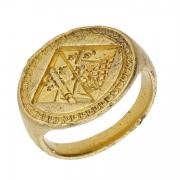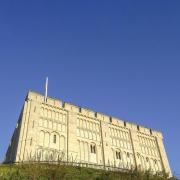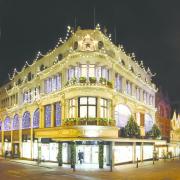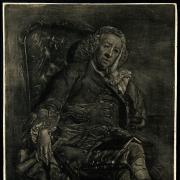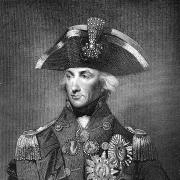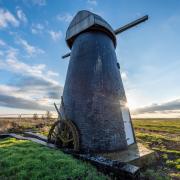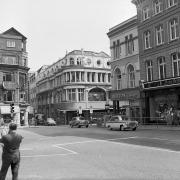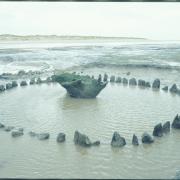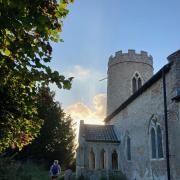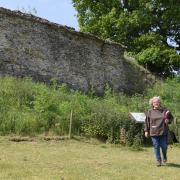John Wright recounts the gruesome story of the Norfolk clergyman and magistrate who emigrated to Tasmania and found horrors almost beyond imagining.
A fun-loving clergyman he must have seemed to the rich and powerful he socialised with, but to those in Tasmania he was sent to manage he was no fun at all.
Reverend Robert ‘Bobby’ Knopwood was born on June 2, 1763 in Threxton, near Watton where his family is still remembered in Threxton Church. His grandfather, also Robert, was a rich farmer and High Sheriff of Norwich in 1751, whose son, yet another Robert, at 36 in 1772 (when son Bobby was eight) would die leaving debts totalling £10,000. Part of the huge family estate, worth £18,000 (£2.9 million today), was sold to pay the creditors when Bobby inherited Threxton Hall, aged 23.

He went to grammar schools at Wymondham at 11 and Bury St Edmunds at 15, and became an unlikely priest at Norwich Cathedral, since he was known more for the company he kept with 'the loose-living Prince of Wales’, Marjorie Tipping wrote in Convicts Unbound, and drinking at the King’s Head, ‘an inn where Mother Dillywater and her ‘lovely fair crew’ reigned.’
He had a child with Hannah Cook and a “where I dine, I sleep” approach to life and loved organising dances and festivities. And in 1803 he migrated to Australia on the Calcutta with its load of convict passengers.
Knopwood was Tasmania’s first chaplain and magistrate, so he could both sentence someone to hang and administer their last rites. His 30-year diary ‘records dreadful floggings of convicts for comparatively trifling offences without indignation’, according to the Dictionary of Australian Biography. Inevitable clashes with aborigines, who needed land to hunt, were similarly fierce.

He wrote, “The natives have been very troublesome for a long time,” and when in 1804, according to the Australian Museum, “colonists were authorised to shoot 50 aborigines at Risdon Cove, Hobart” after they “resisted,” he simply reported hearing cannon fire. Yet one of his servants, convict John Gain, was “discharged for ill-treating his dogs,” Tipping wrote.
Knopwood enjoyed eating well with the colony’s natural survivors, like convicted embezzler Andrew Whitehead and William Stocker, who got one of the earliest pardons and ended up with 555 acres of land, a butcher’s shop and a pub. Many faced starvation in the settlement’s earliest days.
England was a six-month sea voyage away and occasional shipments of cattle and sheep sent from Sydney were pilfered by convicts.

Once sentencing a man to 500 lashes for stealing a goat, Knopwood organised hunting and fishing trips and coped with food shortages very well. For dinner on September 3, 1804 his diary reports that he and his nine guests had “Fish, kangaroo soup, roast kid, roast kangaroo, two fowls pellewed with rice and bacon, pig, stewed duck, kangaroo pie, plum pudding, vegetables, wine sauce, gravy, boiled rice, stewed mushrooms, salad and bread sauce.”
As for his church responsibilities, Geoffrey Stephens wrote in Knopwood: A Biography that he “was known to abandon church services if attendances were poor, the heat was oppressive or if he was suffering from a hangover.” Apart from those he flogged or hanged Knopwood was quite popular, one historian saying: “the small community enjoyed the ramblings of the red-faced parson,” his diary showing genuine sadness in 1815 at having to cancel a St Patrick’s Day race meeting “on account of so many bushrangers being in the woods.”
But one of Knopwood’s serious blunders was releasing the man they called ‘the man-eater of Macquarie Harbour.’ An American book said he lured fellow convicts to ‘his lair in the woods,’ where he would eat them.

Tasmania’s Cornwall Chronicle in 1850 claimed that he used to be a pie man, the Hobart Town Courier in 1854 writing that Pearce was imprisoned for ‘selling unwholesome meat made into pies.’ The story had many embellishments but was any of it true?
Irishman Alexander Pearce, 30, transported in 1820 for stealing shoes, escaped with six other convicts in 1822 from a high-security island prison at Sarah Island on Tasmania’s isolated west coast. They would have to make their way up and down mountains, through rainforests with misty rain falling the whole time, force their way through dense scrub and across wild rivers. They were lost almost immediately.
They carried only a few days’ worth of stolen food. Aborigines knew how to survive here, but not these men. It was Pearce who got all the infamy; not because he escaped successfully, but because in the end he was the one who, after several months in the bush with all the others, was seen to walk out alone.

Their food ran out after a week. They tried boiling the leaves of certain trees to extract the juice. It made them sick. They started eating “wild berries and their kangaroo jackets, which they roasted,” James Bonwick wrote in The Bushrangers. But it didn’t fill them for long.
Dan Sprod quoted Pearce in Alexander Pearce of Macquarie Harbour, as saying: “Kennely said he was so hungry, he could eat a piece of a man.” Another of the men, Robert Greenhill, had introduced the subject, saying: “he had seen the like done before, and that it tasted very like pork.” From Pearce’s own account, as dictated and written down by Knopwood, and now residing in the National Library of Australia, the eight men decided to cast lots and Thomas Bodenham lost.
Later when he slept, Greenhill killed him by giving him “a Severe blow in the Head…then taking his knife began to cut the body into pieces.” They put the body on the fire to cook. John Mather was next. He wrestled the axe away from Greenhill and got the others to agree not to let him have it any more.

But they lied. Then it was Irishman Matthew Travers’s turn. He’d been bitten by a snake and was slowing them down. “Each of us took as much of the body of Travers as we could carry,” Pearce said.
Ironically, one day they heard voices, a big group of aborigines; but instead of befriending them they scared them away and ate the kangaroo flesh, snakes and possums they left behind.
Then Greenhill tried to kill Pearce in his sleep, but Pearce was pretending, and later killed Greenhill with the axe when he nodded off. Pearce later said: “I cut off part of his thigh and arms, which I took with me… until I had ate it all.” And then there were three.
Alexander Dalton and William Kennely ran off, and eventually Alexander Pearce found his way back to civilisation. When he said what he’d done to stay alive, Robert Knopwood didn’t believe him.
He assumed he was lying to protect the others who were still at large. So, instead of hanging him, he sent him back to Macquarie Harbour where Pearce escaped again with another convict, Thomas Cox, who had begged to go with him.
Clearly, Tom hadn’t heard the gossip. A week later Pearce gave himself up. No thanks to Robert Knopwood, but even this time there would not have been any evidence to hang Pearce if, despite still carrying some of the food they’d stolen, it wasn’t for bits of Thomas Cox they found in his pockets.





